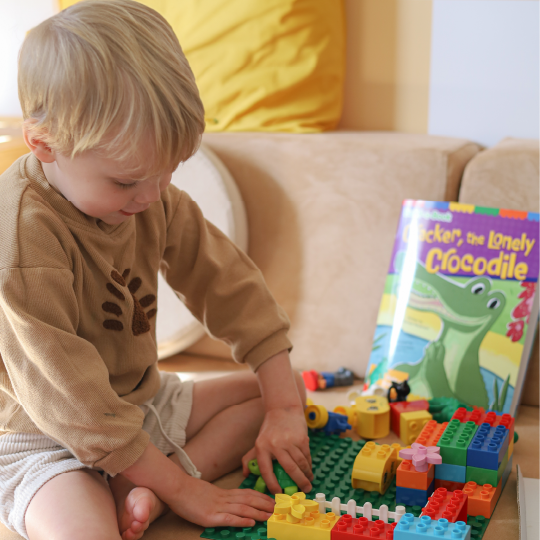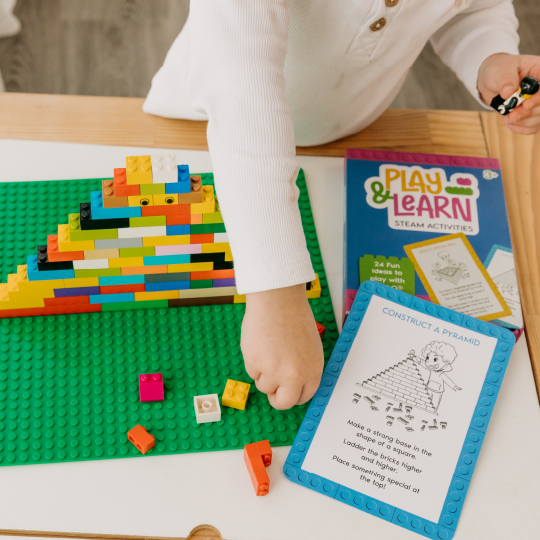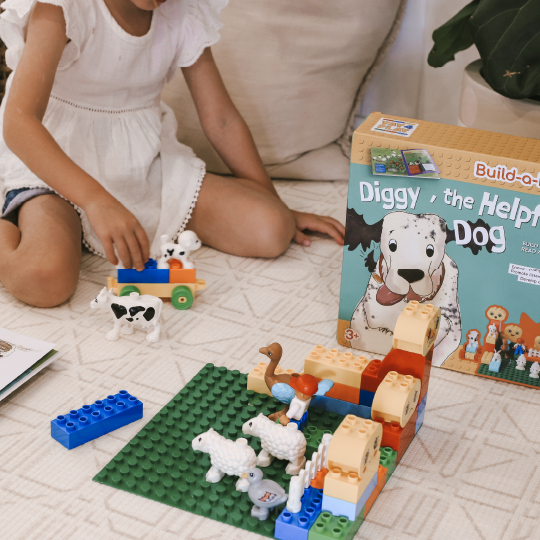The Six Bricks methodology is a transformative educational approach that uses playful learning to foster holistic child development.
By engaging children in play-based learning with six brightly coloured DUPLO® type bricks, this method stimulates cognitive, social and emotional growth. This is turn creates a strong foundation for lifelong learning.

Understanding the Six Bricks Method
Developed by Care for Education in South Africa to promote inclusive learning, the Six Bricks approach integrates bright colour bricks —red, yellow, orange, green, light blue, and dark blue. The bricks are all DUPLO size bricks.
These versatile tools empower children to engage in various bricks activities, encouraging creativity, problem-solving and collaboration. These are all key learning skills for ongoing school success.
Core Principles
Childhood educators implement Six Bricks as an innovative play pedagogy for several reasons:
- Hands-On Learning: Children interact directly with bricks to explore shapes, numbers, and patterns. This is a way of enhancing tactile engagement and comprehension.
- Playful Learning: The methodology combines structured and open-ended activities, allowing for both guided exploration and spontaneous creativity.
- Multi-Sensory Engagement: Activities leverage touch, sight, and sound to create a rich, immersive learning environment.
- Social Interaction: Group tasks develop collaboration, empathy, and communication skills. The primary focus of Six Bricks is to develop executive functioning skills.
- Achievement of curriculum learning: Six Bricks activities align seamlessly with educational curricula, enhancing maths skills and other essential skills such as literacy.
- Affordable resource: The six brick skill building activities are all within budgetary reach. They are also used all year round to continue to build towards the achievement of learner outcomes. That is exactly what is needed as a foundation for school success into the future.
- Huge application potential: There is a large bank of ideas for Six Bricks educators. Literally hundreds of activities based on the method. And the great thing is that when you see these activities in action, you immediately understand how they support skills development including – motor movement, bilateral & cross-lateral movements.

Benefits of Six Bricks in Child Development
Cognitive Development
Through Six Bricks activities, children improve memory, attention and problem-solving. By tackling challenges during play-based learning, they cultivate critical thinking and decision-making skills.
Physical Development
Handling the bricks refines fine motor skills and hand-eye coordination—vital for writing, drawing, and self-care tasks.
Social and Emotional Development
Collaborative activities teach children to communicate effectively, share resources, and build empathy, nurturing emotional intelligence and resilience.
Implementing Six Bricks in Educational Settings
Early Childhood Education
The bright, tactile design of Six Bricks engages young learners, making it ideal for early education environments.
Activities can be tailored to support developmental milestones and provide amazing learning opportunities for core learning skills.
Primary Education
Six Bricks supports outcomes in mathematics and language development.
It’s a powerful hands-on tool to visualise abstract concepts, such as addition or storytelling.
This approach supports academic achievement and has a positive influence on the achievement of curriculum learning outcomes.
Special Education
The flexibility of Six Bricks ensures inclusivity for diverse learning needs. Its multi-sensory design is particularly effective for children with developmental differences.
It is a dynamic learning experience that supports and easily integrates with the childhood education curriculum.
Afterschool Building Club
A great way to use the building blocks and implement active games across many age groups.
Professional Development for Educators
To maximize the potential of Six Bricks, educators can participate in professional development programs offered by Six Bricks Learning. These include:
- Six Bricks Accreditation: Comprehensive training on the methodology’s applications and activities.
- Six Bricks for Maths: A hands-on approach to building numeracy skills through play.
- Six Bricks for Autistic Children: Use the method for children with skills development needs.

Educational Resources
Six Bricks Learning provides a range of resources to simplify integration:
- Six Bricks Activity Mats Teacher Guide: Structured teaching notes for a variety of activities. These include the ability to download and print the mats in suitable sizes for all class levels.
- Six Bricks for Skills Development online learning portal: A collection of over 50 activities designed to improve basic level skills such as colour awareness, the ability to sort colour, the application of numeracy skills and hand-eye coordination games.
Why Choose Six Bricks Learning?
With over 34 years of expertise in education, Six Bricks Learning is a trusted leader in creating innovative, impactful learning experiences.
Our programs and accessible and cost-effective resources foster a lifelong love of learning. They prepare children for success in an ever-changing world through the development of core skills and executive functioning skills.
The Six Bricks methodology is revolutionising education in early learning centres by integrating play-based learning into diverse settings.
By incorporating Six bricks in classrooms, educators can unlock children’s creative potential and promote their overall development.
Discover more about how we are re-imagining learning at www.sixbrickslearning.com.
What are our products and services?
- We train educators in how to use the Six Bricks method as a way of improving the physical skills and perceptual skills of their pre-school and Year K groups.
We are committed to introducing this hands-on, experiential learning into classrooms around Australia.
Our Six Bricks training courses are all online and introduce you to the Six Bricks pedagogy as well as to the Six Bricks principles.
- We promote active learning and life-long learning skills through our product line that is designed in Australia.
It is a unique way of working towards all aspects of child development so that children have lifelong learning skills all the way through their careers.
- Besides our Bricks materials packs to get you started, we have other products such as Build-a-Book and our Play and Learn Idea card decks.

NOTE: Further information on Playful learning
Why Playful Learning Matters
Research highlights that children learn best when they’re engaged and enjoying themselves. Playful learning promotes intrinsic motivation, ensuring that children are not only absorbing knowledge but also developing a passion for lifelong learning.
Six Bricks, with its versatile and interactive design, embodies the essence of playful learning, making it a cornerstone of innovative education.
Playful learning is an educational approach that merges the joy of play with purposeful learning experiences, fostering holistic development in children.
The Six Bricks methodology exemplifies this by providing hands-on, engaging activities that are both fun and educational.
Playful learning goes beyond traditional teaching methods, creating an environment where curiosity, creativity, and critical thinking thrive.
What Makes Playful Learning Unique?
Active Engagement:
In playful learning, children are active participants rather than passive recipients. With Six Bricks, they engage in tasks that stimulate their curiosity and problem-solving abilities, such as building towers, creating patterns, or matching colours.
Intrinsic Motivation:
The element of play naturally motivates children to explore and experiment. Activities like sorting bricks by shape or competing in speed challenges encourage them to learn without realizing they’re acquiring new skills.
Joy and Enjoyment:
Learning becomes a source of happiness. Playful learning with Six Bricks fosters a love for discovery and builds a positive association with educational experiences.
Flexibility and Adaptability:
Playful learning allows children to explore concepts in ways that resonate with their individual learning styles. Six Bricks activities are open-ended, giving children the freedom to invent games or come up with unique solutions.
